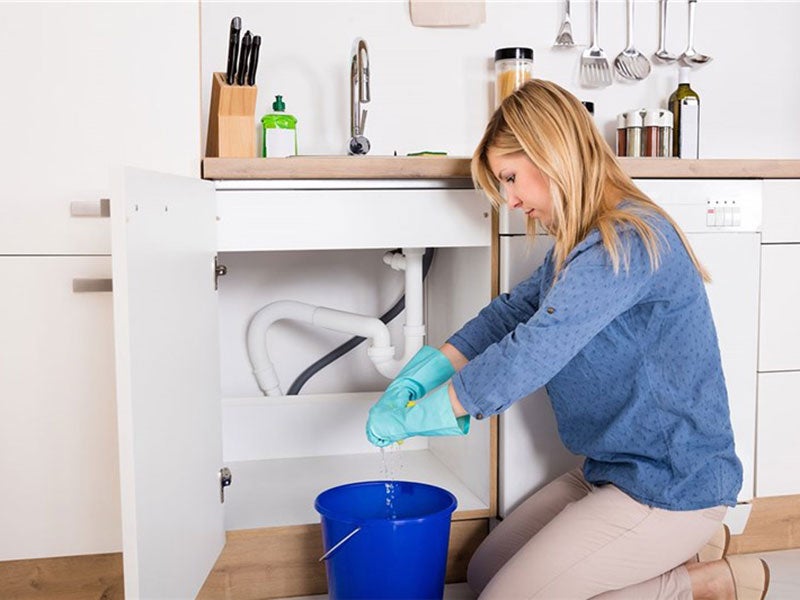CALL YOUR TRUSTED LOCAL EXPERTSSM
The 5 Most Common Plumbing Emergencies (And How to Prevent Them)

Plumbing emergencies are among the most dreaded problems that homeowners face. However, they’re oftentimes very preventable. Proper maintenance can dramatically reduce the probability of a plumbing disaster, whether it’s from broken or damaged pipes to gas leaks, or blocked drains. This is why it’s so important to learn how to prevent some of the most common plumbing disasters before they happen, to avoid the inconvenience and surprise expense of a costly plumbing nightmare down the road.
At Four Seasons Plumbing and Sewer, we strongly advise effective maintenance regimens to preserve the integrity of our customers’ plumbing systems. In fact, our team of Chicago plumbers specializes in offering top-quality repair and maintenance services, designed to keep the pipes and drains of your home in excellent condition at all times.
The truth is that no one has the time or the money for a plumbing emergency, especially when it could have been prevented with proper maintenance and care of your home. In this guide, we’ll go over some of the most common Chicago plumbing emergencies that homeowners face, and some of the steps you can take to protect yourself from the stress and financial burden of a plumbing disaster.
Problem #1: Burst Pipes
Burst pipes happen most of the time over the winter when the pipes freeze over in extremely cold weather. There are many reasons for pipes bursting, however, and homeowners are sometimes surprised to learn that they can happen in the summer, fall, and spring for various reasons, including corrosion and unregulated water pressure.
There are many ways to prevent burst pipes. In the winter, when the temperatures dip below freezing, you can let a trickle of warm water flow through at all times through the pipes, have foam insulation covers installed over the piping, and keep your home heated above 55 degrees Fahrenheit at all times to keep the pipes warm.
Throughout the rest of the year, you can also help to prevent burst pipes by having the water pressure monitored and regulated. Pipes can burst if the water pressure is too high, so have a trusted plumbing company visit your property to test the movement of the water. If the pressure is too forceful, your plumber will install a pressure-reducing valve to bring it down to lower levels before an accident occurs.
Problem #2: Frozen Pipes
Pipes that become frozen can expand and burst—leading to an expensive pipe replacement or repair. When the weather gets cold or drops below freezing, the water in the pipes can freeze and must be thawed out immediately.
You can prevent frozen pipes by following some of the instructions in the first tip (for preventing a burst pipe due to winter freezing). Some of the suggestions include keeping your household thermostat set to 55f or higher and letting warm water trickle out of the faucets during cold spells to keep the pipes thawed out. Inside the home, you can also open cabinet doors to warm pipes using your home’s central heating system, and have foam insulation covers placed over the pipes to keep them warm.
Problem #3: Leaky Faucets and Fixtures
Leaky fixtures can be caused by a number of issues—all of which are completely preventable with an excellent maintenance routine. A plumber can provide homeowners with a home evaluation to spot evidence of corrosion, worn-out or deteriorating seals, and other problems that wastewater, and can cause structural damage (in the case of leaking pipes). Once these issues have been spotted, the problematic fixtures can be fixed or replaced before being given a chance to cause real damage (or a spike in your water bill).
Problem #4: Blocked Drains & Toilets
Blocked sink drains and clogged toilets are very common plumbing issues that can usually be solved using a toilet plunger to get rid of the obstruction. Sometimes, however, the problem is more serious and will require intervention from a skilled plumber.
Preventing blocked drains requires a bit of education about the proper use of the toilet and sink areas. Your household should know what is flushable and what isn’t—for example, grease, fats, and oils, paper towels, sanitary napkins, and many other waste items are not flushable and should never be tossed down the drain. You can also prevent clogs by addressing slow draining as soon as you notice it. Call your plumber to have them provide the proper maintenance or repairs necessary to keep drains flowing fast at all times (and to prevent clogs before they start).
Problem #5: Gas Leaks
Gas leaks can be incredibly dangerous and even deadly, which is why it’s so important to do everything we possibly can to prevent them. The best thing to do to prevent gas leaks from happening is to ask your plumber to have your appliances (stoves, ovens, boilers, and other gas appliances) serviced and maintained regularly, and replaced or fixed as soon as they become old or dysfunctional.
You should also have a carbon monoxide detector installed and functioning perfectly in your home. While this won’t help you to prevent a gas leak, it will alert you if one suddenly happens. Remember to check the device continually to ensure that it’s working properly, and have the batteries replaced periodically to ensure that it’s protecting you and your household at all times.
If you live in the Chicago area and would like more information on preventing a potential plumbing disaster before it happens, Four Seasons Plumbing and Sewer can help with 24/7 plumbing and sewer services. Our company is dedicated to assisting homeowners with everything they need to experience the joys of living in a functional and problem-free environment. Give us a call to discuss our Chicago emergency plumbing services with one of our friendly representatives. You can also fill out our online form to have us contact you about setting up a fast, no-obligation, in-home pricing estimate, and consultation.


